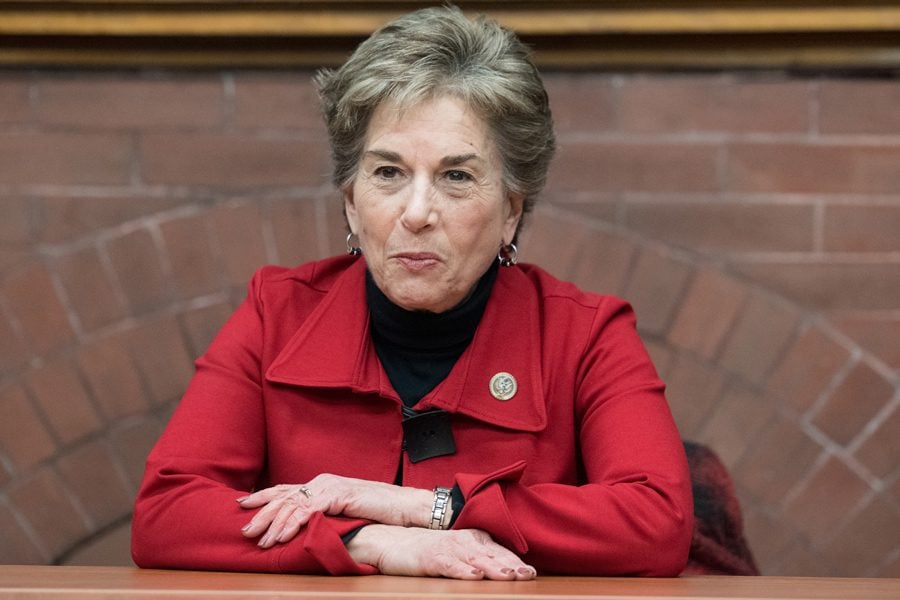Schakowsky talks economic inequality, U.S. Census
Colin Boyle/Daily Senior Staffer
U.S. Rep. Jan Schakowsky (D-Ill.) speaks at a Political Union event. Schakowsky highlighted the importance of addressing income inequality in a Thursday Q&A.
January 26, 2018
U.S. Rep. Jan Schakowsky (D-Ill.) fielded questions from audience members at a Q&A event Thursday, saying economic inequality is the country’s most serious domestic issue.
About 20 people attended the talk, hosted by Northwestern Political Union at the Buffett Institute for Global Studies. Schakowsky addressed topics ranging from the automation of manufacturing jobs to potential changes in the 2020 Census. Schakowsky started off the Q&A by emphasizing her concern with the country’s growing economic inequality, a topic she said she keeps in mind when making decisions as a representative.
“The frame in which I consider economic issues and vote on them, is does it increase economic inequality in this country or decrease it?” Schakowsky said.
Political Union Co-President Max Rowe said the group brought Schakowsky due to her prominence to the community and the likely draw of students who have a passion for politics.
Schakowsky said one trend in the current economy is the continuing loss of previously held “guarantees,” such as pensions and rollbacks. To find its way back to an economy that works for everyone, the U.S. should pursue a higher minimum wage, increased infrastructure spending and further investment in public education, she said.
When asked about any talk on Capitol Hill concerning the potential of job elimination due to increased automation, Schakowsky acknowledged that is a valid concern. But, Schakowsky noted that there have been major technological changes in the past and that automation may bring jobs as well.
“The problem with some of those jobs is they don’t pay a living wage,” Schakowsky said. “Often it’s not about their job; it’s about the wage. So we have to make sure these jobs pay.”
Lois Taft, a retired professor who attended the event, said she came because she was “interested to see where Jan stands on certain issues.”
Taft said she was most interested by Schakowsky’s concern over Republican talks to add the question of “Are you a citizen?” to the Census.
Schakowsky said including the question could even reduce response rates among U.S. citizens, which she predicts could decrease the population estimates for blue states such as California, or states such as Texas that Schakowsky believes to be “flippable.” A decrease in the response rate would predictably reduce those states’ proportional representation in the House, hurting Democrats, she said.
Rowe said he thought the event went well, and that he appreciated Schakowsky’s willingness to come to campus.
“I think it gave us a real chance for a mixing of political bodies,” Rowe said. “And that’s our mission as Northwestern’s Political Union, to allow for Northwestern kids to see that side of politics and vice versa.”
A previous version of this story misstated Max Rowe’s position in Northwestern Political Union. He is co-president of the organization. The Daily regrets the error.
Email: [email protected]


